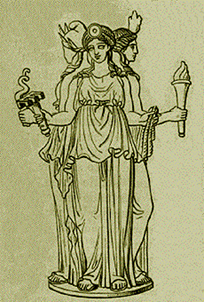Hekate is a familiar name to many modern pagans and occultists, particularly those that follow a Hellenic path. Although regarded by some as a “dark” goddess, in truth, Hekate is far more complex than that. There’s a reason she is often seen with three faces, or Trimorphos. Other epithets include Ameibousa, one that transforms, Polyonumos, many-named, and some modern worshippers use the epithet Polymorphos, meaning many-formed. That’s because this fascinating deity has many forms indeed and interacts with the world and its inhabitants in a multitude of ways.

Who is Hekate?
Hekate is a complex goddess, hard to define in simple terms. In Greek mythology, she is actually a Titan, daughter of Asteria and possibly Perses. Despite the Titans and Olympians being at each other’s throats, Hekate was allowed to live by the Olympian ruler, Zeus. And, let’s be clear, this wasn’t a grudging reprieve by the king of gods. Hesiod’s Theogony states that Zeus honoured Hekate above all others, and granted her dominion over land, sea, and sky. Today, many Hekate worshippers honour this liminal aspect of her power, that she connects the three realms and exists in the places between them.
Hekate is also famous as a key character in the abduction of Persephone. When Persephone is captured, Hekate is the first one to offer help and comfort to Demeter, Persephone’s distraught mother. Hekate is even referred to as tender-hearted, and easily took Demeter from the land to the sky to seek out Helios for further aid.
Why is Hekate one of our Family Deities?
Hekate’s epithet, Kourotrophos, names her as a guardian or nurturer of children, making her a natural choice for a family deity. It’s possible that Hekate Kourotrophos was honoured at specific dates, possibly in conjunction with Artemis or other deities bearing the same epithet (Cyndi Brannen, 2019). Hekate’s influence in terms of protecting children is still so recognised today that modern rites exist specifically for this purpose.
Another reason Hekate is ideal for families is that she is associated with virtues that most people will want to nurture in themselves and in their children or other family members. The modern Covenant of Hekate focuses on five virtues associated strongly with Hekate:
- Wisdom
- Courage
- Compassion
- Temperance
- Justice
Their Prayer of the 5-Virtues includes the line “Compassion towards all beings,” something many Pagans strive towards.
Hekate was also considered a household goddess and offered protection from a range of forces, from criminals to unwanted spirits. She protects entrance ways, another liminal space that marks the transformation from one place into another. It’s quite common to leave offerings for Hekate at a sacred space by a doorway.
Honouring Hekate
There are so many resources for those wanting to honour Hekate today. Look out for resources that hark back to Greek mythological resources such as the Homeric Hymns or Hesiod’s Theogony. Learning about Hekate’s many different epithets can also help you get a better understanding of Her.
Hekate is often honoured at the dark or new moon. When the moon is not visible at all, Hekate’s celebration is called Deipnon and usually involves offerings of food or a meal in Her honour or in honour of those who have passed. The liminal time between the moon waning and waxing is very sacred to Hekate.
On the first day of the visible new moon Noumenia is celebrated, which involves more offerings, but also perhaps cleaning and refreshing the home or sacred spaces, and filling the home with the fragrance of incense or flowers. Both Deipnon and Noumenia are celebrated by many modern Hellenic Pagans and others.
Offerings are often left at a crossroads, and it’s traditional that you don’t look back as you walk away from a crossroads where you have left offerings to Hekate.
Hekate Correspondences
Animals
A black lamb
Dogs, particularly black dogs
Deer
Horses
Snakes or serpents
Plants
Garlic
Yew
Cypress
Images
Boundaries and borders, any liminal spaces
Two torches, often replicated on an altar by using two plain, white candles
Keys
Crossroads
Offerings
Garlic
Eggs
Olive oil
Living water i.e. clean rain water or water from a stream or other natural source
What are your own experiences with Hekate or other family-oriented deities? Tell us all about it over at our Facebook Group.
